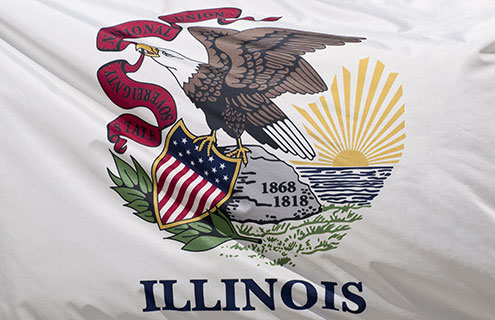Illinois is on the verge of a captive insurance framework reform that could provide a substantially improved environment for companies in the state looking for captive solutions, and drop the premium tax rate on self-procured insurance.
SB 1737, which is awaiting the signature of state governor Bruce Rauner, would amend the Illinois Insurance Code’s regulatory framework favourably for captives, following the lead of jurisdictions like Vermont, Hawaii and South Carolina.
The bill was passed by the Illinois General Assembly on 31 May 2018 and is supported by the state’s Department of Insurance (DoI), key industry groups, and multiple large Illinois-based taxpayers.
If passed, the bill and framework reform will be advantageous for captive insurance in the Prairie State in a number of ways.
Firstly, it would give the Illinois Director of Insurance the broad authority to set minimum capital and surplus for captives licensed in the state, based on the amount of premium written, the type of assets held by the captive, the terms of reinsurance arrangements, the types of business covered in policies issued by the captive, the underwriting practices and procedures of the captive, and any other criteria that is deemed to have a significant impact by the Director.
According to the bill, the capital and surplus requirements must not be less than $250,000 for pure captives, $500,000 for industrial insured captives, and $750,000 for association captives.
The bill also permits captives to meet the minimum capital and surplus requirements using Illinois bonds, US-backed securities or an irrevocable bank letter of credit approved by the Director.
Secondly, the bill would authorise captives in the state to write insurance that covers the risks of a ‘controlled unaffiliated business’, an unaffiliated entity with whom an affiliate of the captive has a contractual relationship, and the risks of a captive’s affiliates.
Captives would also be authorised to issue contractual reimbursement policies to affiliated certified self-insurers—as long as they were authorised under the Illinois Workers’ Compensation Act or an analogous law of another state—and to affiliates insured by workers’ compensation insurance policies with a negotiated deductible endorsement.
The bill would also offer enhanced lending flexibility to Illinois-licensed captives, providing that the captives may make loans to their affiliates.
Additionally, it authorises captives to accept risks from and cede risks to, or take credit for, reserves on risks ceded to an approved affiliated captive insurer or captive reinsurance pool–with the approval of the Director.
Another key change in the bill is the rate drop of self-procurement tax in Illinois.
It proposes a drop in the premium tax rate for contracts of self-procured insurance from 3.5 percent to 0.5 percent of gross premium.
If it is signed into law, the bill would take effect for policies with an effective date on or after 1 January 2018.
International law firm McDermott Will & Emery strongly supports enactment of the bill, which “is an important and exciting development for the captive community”.
In a blog post, McDermott counsel Thomas Jones, alongside partners Lisa Kaderabek and Mary Kay McCalla Martire, explained: “Illinois’ underdeveloped captive law and its high self-procurement tax rate have meant that Illinois has never been a viable option as a captive jurisdiction.”
“The bill, if enacted, will be a positive step forward, and will certainly warrant consideration by Illinois-based enterprises that have previously had no real option but to locate their captives elsewhere.”
According to the blog post, the success of the state’s captive market depends on whether the DoI is supportive in the way it adopts regulations, handles applications and provides interpretations, as well as whether service provider infrastructure develops.
It said: “Fortunately, many captive service providers already have a presence in Chicago and other Illinois locations.”






